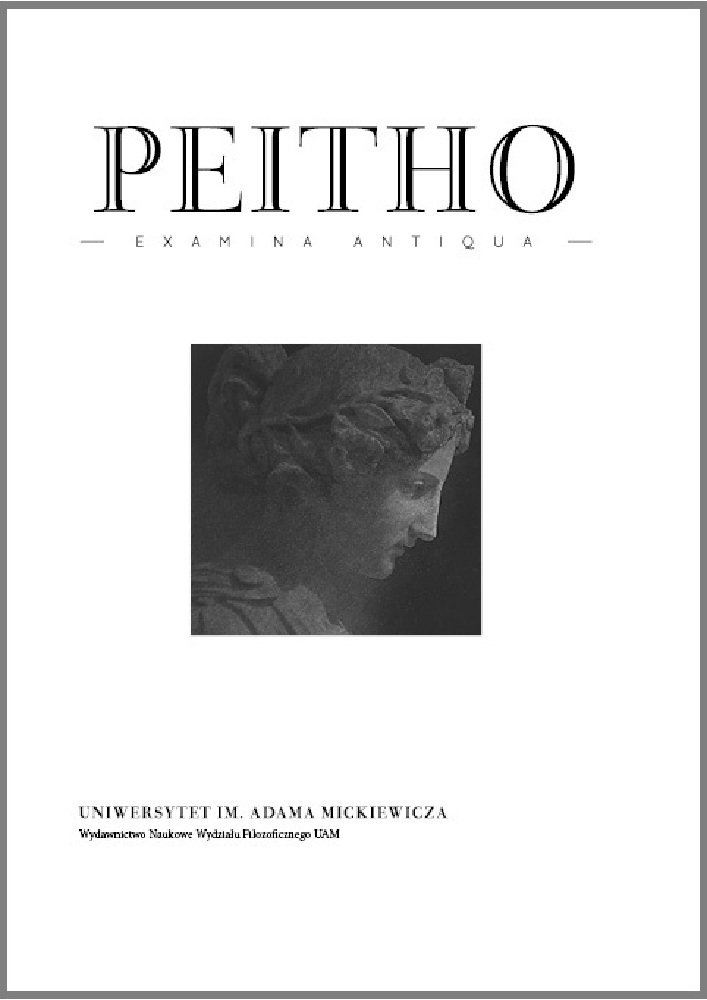Abstract
While the aim of the present paper is to analyze Olympiodorus’ commentary to Plato’s Phaedo, particular attention will be paid here to the role of hēdonē. The first part of the text presents the four conceptions of the pleasure that can be found in Plato’s dialogue. Although pleasure does not play the most prominent role either in the Plato’s dialogue or in the Neoplatonic commentary, Olympiodorus’ attitude to this issue reveals an important change and difference between the philosophical views of Plato and those of Olympiodorus. The latter does not seem to discern the possibility that pleasure can have its spiritual dimension (which Plato regards as possible). Thus, the experience of hēdonē is reduced solely to the sphere of the senses and even in this area its role needs to be minimized: in this form it has to be carefully measured and controled. Furthermore, Olympiodorus does not see that so-called hedonistic calculus: whilst it is not strictly speaking connected with virtuous actions, it still can have some significance for the the philosopher’s life.
References
AA.VV., Genethliakon. Carl Robert zum 8. März 1910, Berlin.
Abbenes, J.G.J., Slings, S.R., Sluiter, I. (eds.), Greek Literary Theory After Aristotle. A Collection of in Honour of D.M. Schenkeveld, Amsterdam.
Adam, J., 1969, The Republic of Plato, vol. II, Cambirdge.
Anonymous, Prolégomènes à la philosophie de Platon, L.G. Westerink (texte), J. Trouillard (trad.), Paris 1990.
Anton J.P., Preus A. (ed.), 1983, Essays in Ancient Greek Philosophy, vol. II, Albany.
Bonazzi, M., Trabattoni, F. (cur.), 2003, Platone e la tradizione platonica. Studi di filosofia antica, Milano.
Boyancé, P., Le culte des Muses chez les philosophes grecs, Paris.
Carpenter, A.D., 2011, „Pleasure as Genesis in Plato’s Philebus”, Ancient Philosophy 31, s. 73–94.
Chroust, A.-H., 1966a, „Eudemus or On the Soul. A Lost Dialogue of Aristotle on the Immortality of Soul”, Mnemosyne 19, s. 17–30.
Chroust, A.-H., 1966b, „The Psychology in Aristotle’s Lost Dialogue Eudemus or On the Soul”, Acta Classica 9, s. 49–62.
Crombie, I.M., 1962, An Examination of Plato’s Doctrine, vol. I: Plato on Man and Society, London and New York.
Dillon, J., 1983, „Metriopatheia and apatheia: Some Refelctions on a Controversy in Later Greek Ethics”, [w:] Anton, Preus (1983), s. 508–517.
Diogenes Laertius, Lives of Eminent Philosophers, T. Dorandi (ed.), Cambridge 2013.
Dumoulin, B., 1981, Recherches sur le premier Aristote (Eudème, De la Philosophie, Protreptique), Paris.
Frede, D., 2009, Lust, w: Horn, Müller, Söder (2009), s. 305–309.
Gersh, S., 1986, Middle Platonism and Neoplatonism. The Latin Tradition, vol. I, Notre Dame.
Gertz, S.R.P., 2011, Death and Immortality in Late Neoplatonism. Studies on the Ancient Commentaries on Plato’s Phaedo, Leiden.
Gritti, E., 2012, Il vero nel mito. Teoria esegetica nel commento di Olimpiodoro Alessandrino al Gorgia, Roma.
Hackforth, R., 1955, Plato’s Phaedo. Translated with Introduction and Commentary by, Cambridge.
Harrison, S.J., 2000, Apuleius. A Latin Sophist, Oxford.
Horn, C., Müller, J., Söder, J. (Hrsg.), 2009, Platon Handbuch. Leben-Werk-Wirkung, Stuttgart.
Jackson, R., 1995, „Late Platonist Poetics: Olympiodorus and the Myth of Plato’s Gorgias”, w: Abbenes, Slings, Sluiter (1995), s. 275–299.
Jaeger, W., 1923, Aristoteles. Grundlegung einer Geschichte seiner Entwicklung, Berlin.
Lenk, C., 2004, Anamnesis und Identität in einigen platonischen Dialogen, w: Lotz, Wolf, Zimmerli (2004), s. 41–58.
Lotz, C., Wolf, T.R., Zimmerli, W.C. (Hrsg.), 2004, Erinnerung. Philosophische Positionen und Perspektiven, München.
Lloyd, A.C., 1998, Anatomy of Neoplatonism, Oxford.
Lutosławski, W., 1897, The Origin and Growth of Plato’s Logic, New York and Bombay.
Lycos, K., 1994, „Olympiodorus on Pleasure and the Good in Plato’s Gorgias”, Oxford Studies in Ancient Philosophy 12, s. 183–205.
Munteanu, D.L., 2011, Tragic Pathos. Pity and Fear in Greek Philosophy and Tragedy, Cambridge.
Nails, D., 2002, The People of Plato. A Prosopography of Plato and Other Socratics, Indianapolis and Cambridge.
O’Keefe, T., 2010, Epicureanism, Durham.
Olympiodorus, 1998, Commentary on Plato’s Gorgias, R. Jackson, K. Lycos, H. Tarrant (transl. and comm.), Leiden and Boston and Köln.
Platon, 1926, Oeuvres complètes, t. IV 1, L. Robin (dir.), Paris.
Platon, 1995, Fedon, R. Legutko (tłum.), Kraków.
Platon, 2004, Phaidon, T. Ebert (Übers. und Komm.), Göttingen.
Platone, 1970, Dialogi filosofici di Platone, vol. I, G. Cambiano (cur.), Torino.
Platone, 1974, Opere, G. Giannantoni (cur.), vol. I, Roma e Bari.
Praechter, K., 1910, Richtungen und Schulen im Neuplatonismus, w: AA.VV. (1910), s. 104–156.
Remes, P., 2008, Neoplatonism, Stocksfield.
Rist, J.M., 1972, Epicurus. An Introduction, Cambridge.
Tarrant, H., 1993, Thrasyllan Platonism, Ithaca and London.
Tarrant, H., 1998, „Introduction”, w: Olympiodorus (1998), s. 1–52.
Trabattoni, F., 2003, Il dialogo come “portavoce” dell’opinione di Platone. Il caso del Parmenide, w: Bonazzi, Trabattoni (2003), s. 151–178.
Urmson, J.O., The Greek Philosophical Vocabulary, London 1990.
Watts, E.J., 2006, City and School in Late Antique Athens and Alexandria, Berkeley and Los Angeles and London.
Westerink, L.G., 1976, Introduction, w: Westerink (1976a), s. 7–32.
Westerink L.G., 1976a, The Greek Commentaries on Plato’s Phaedo, vol. I: Olympiodorus, Amsterdam and Oxford and New York.
Wildberg, C., 2008, Olympiodorus, w: Zalta (2008), http://plato.stanford.edu/archives/fall2008/entries/olympiodorus [dostęp: 14.11.2014].
Zalta, E.N. (ed.), 2008, Stanford Encyclopedia of Philosophy, http://plato.stanford.edu/ [dostęp: 14.11.2014].
Zanatta, M., 2008, Introduzione, w: Aristotele, I dialoghi, M. Zanatta (cur.), Milano.
License
Peitho provides immediate open access to its content on the principle that making research freely available to the public supports a greater global exchange of knowledge.
